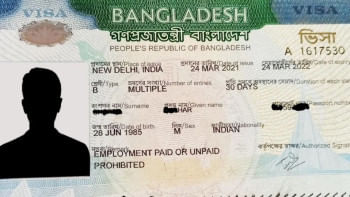Dhaka remained silent on rights concerns
The Bangladesh delegation to the United Nation's Universal Periodic Review failed to respond to pressing human rights concerns in the country, Human Rights Watch said yesterday.
“Law minister Anisul Huq speaking for the government, highlighted only what the government considered to be positive steps and glossed over concerns about critical issues such as enforced disappearances, secret and arbitrary detention, extrajudicial killings, and a crackdown on freedom of speech and association,” said an HRW statement.
Bangladesh should show its commitment to human rights by giving full consideration to the recommendations from other countries and accepting those that would significantly improve its compliance with international human rights standards, it said.
“Bangladesh needs to stop ignoring and start addressing serious human rights violations, such as when its security forces engage in enforced disappearances, killings, torture, and arbitrary arrests, many of them politically motivated,” said Brad Adams, HRW Asia director.
“The Bangladesh government should use the Universal Periodic Review at the UN Human Rights Council as a time for reflection, not self-congratulation.”
The Daily Star tried to contact Anisul for comments but failed.
The statement said a number of member countries rightly praised the government's willingness to open the Bangladesh border and provide aid to hundreds of thousands of Rohingya fleeing atrocities by the Myanmar military.
“The Bangladesh delegation spoke at length about the progress on handling the influx of the Rohingya refugees but responded with silence and denial to questions and recommendations by several countries, including concerns about extrajudicial killings, enforced disappearances, and attacks on human rights defenders,” it said.
HRW and other groups have reported for many years about human rights concerns in Bangladesh, and many of these concerns were simply not addressed adequately by Bangladesh in the hearing, the statement said.
In one example, the government pledged during the previous periodic review in 2013 to thoroughly and impartially investigate and prosecute all allegations of human rights violations, in particular by the security forces.
But it has ignored and denied reports of violations since then, including about violence by security forces during the 2014 elections and against people who protested the conduct of the elections, the HRW said.
The government delegation claimed that it is taking action against those responsible for abuse, but there is little evidence or transparency on this, it said.
HRW claimed it has also documented several cases in which members of the political opposition have been forcibly disappeared or secretly detained without charge.
The government has also failed to keep a commitment to end child marriage.
In February 2017, the government approved a law with a new exception that allows girls under 18 to marry under special circumstances, with no minimum age stipulated, added the HRW statement.


 For all latest news, follow The Daily Star's Google News channel.
For all latest news, follow The Daily Star's Google News channel. 








Comments